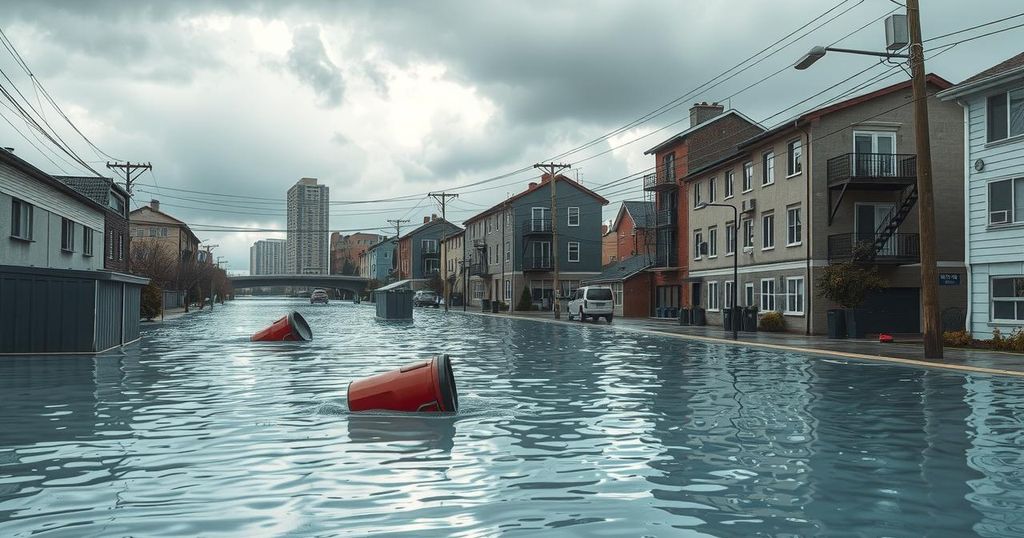Burundi: Climate Change Challenges Unveil Urban Dangers During Rainy Seasons
Burundi suffers from substantial rainfall that leads to flooding, loss of life, and economic disruption, especially in Bujumbura. Authorities are criticized for negligence and insufficient urban planning, contributing to environmental displacement and vulnerability among residents. The government seeks international support to enhance disaster management capabilities amidst increasing climate change impacts, while community education on environmental responsibilities is deemed essential.
Burundi, located in the Great Lakes region of Eastern Africa, experiences significant rainfall for nine months of the year. The rainy season, which begins in September after a three-month dry period, brings both necessary water and devastating consequences. In Bujumbura, the economic capital, heavy rains often result in loss of life, environmental displacement, and halt to daily activities due to flooding caused by unchecked construction and deforestation, exacerbated by the ongoing climate crisis.
Heavy rainfall annually claims many lives; for instance, in October 2024, two children tragically drowned while returning home from school in Bukirasazi commune. Witnesses report this is a frequent occurrence during rainy seasons, leading to heightened anxiety among residents. Affected citizens express frustration at the authorities’ inaction despite being aware of the situation, stating, “The rainfall kills, disrupts sleep, and results in environmentally displaced people every rainy season due to their homes flooding.”
The economic impact of severe rainfall significantly affects vulnerable populations. Truck drivers, who rely on delivering building materials, suffer profound income reductions as muddy roads become impassable, leading to a decrease in trips from ten to five during the rainy season. Suppliers like Nzeyimana Thomas emphasize that their income drastically declines due to adverse weather conditions, while anonymous truck owners criticize the government’s failure to maintain adequate road infrastructure despite the taxes they pay.
The Burundian Constitution outlines the government’s responsibility for effective land-use management. Citizens impacted by recurrent flooding expect the authorities to implement robust measures that include upgrading roadways and drainage systems. Bigirimana Constantin, director-general of the Burundi Road Agency, acknowledges the destructive impact of rain on infrastructure but also highlights the role of unregulated urbanization and inadequate drainage systems in exacerbating the situation.
As urban overpopulation and climate-related damage rise, the Burundian government seeks international assistance to address these challenges. Innocent Banigwaninzigo, an environmentalist, notes that the government cannot tackle the climate crisis alone and must encourage collaboration with external partners for disaster management. He stresses the importance of adhering to existing legal frameworks concerning resource management, although enforcement remains an issue plagued by corruption.
Banigwaninzigo advocates for enhanced community education on environmental responsibilities, suggesting that a shift in mindset is necessary to address climate change effectively. Compounded by population growth and unregulated development encroaching on forested regions, the need for sustainable practices is critical. Residents often assert they received land or building permits from authorities without verification, raising concerns about rampant corruption in the construction sector.
Burundi’s vulnerability to climate change jeopardizes public safety, prompting the urgent need for coordinated efforts among government sectors to mitigate the escalating impacts of environmental challenges. Without decisive action, the adverse effects of climate change will continue to threaten lives and livelihoods in this East African nation.
In summary, Burundi faces severe challenges due to climate change, particularly during the rainy season, which causes significant loss of life and economic disruption. The government’s failure to implement effective measures in urban planning and infrastructure maintenance exacerbates these issues. Community education and enhanced cooperation with international partners are essential for addressing climate-related challenges and protecting vulnerable populations. The authorities must act decisively to harmonize their efforts in mitigating the impacts of climate change.
Original Source: globalvoices.org




Post Comment